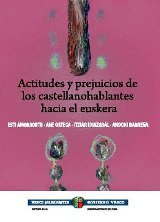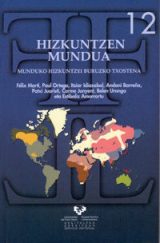Carried out projects
Attitudes towards Basque language project ("Euskarari buruzko Jarrerak")
Following the agreement between UNESCO ETXEA and the Ministry of Linguistic Policy of the Basque Government (2006- 2008), the project on the linguistic attitudes towards Basque called "Euskarari buruzko Jarrerak" had the collaboration of this Chair. This project was finished in March 2009, with the publishing of a very actual and original report:
-
Amorrortu, E.; Ortega, A.; Idiazabal, I.; Barreña, A. (2009). Erdaldunen euskararekiko aurreiritziak eta jarrerak. Bilbao: Eusko Jaurlaritza/Gobierno Vasco.
The Spanish edition of this report, "Prejuicios y actitudes de los castellanohablantes hacia el euskera", is currently being revised and will be published shortly.
Arratiako BIHn hizkuntza aniztasunari buruzko hausnarketa proiektua
Azkue Fundazioarekin 2020an sinatutako hitzarmenari esker aurrera eraman ahal izan zen proiektu hau 2020ko urte osoan zehar .
(COVID19-aren eraginez ezin izan ziren planifikatutako dinamika guztiak aurrera eraman)
Euskarazko Wikipedia hizkuntza gutxituei buruzko informazioarekin elikatzea
Azkue Fundazioarekin 2020an sinatutako hitzarmenari esker aurrera eraman ahal izan zen proiektu hau 2020ko urte osoan zehar.
Euskarazko Wikipedian sortutako edo editatutako 10 hizkuntzak: wolofa, kitxua, nasa yuwea, enberera, shipibo-konibo, bariba, tseltala, zeinu hizkuntza, amazigera eta tongera.
Institucionalización de la Educación Bilingüe Intercultural en la Universidad Pública de Guatemala
Invitado por la Universidad Pública de Guatemala, por la Universidad San Carlos de Guatemala (USAC), por la ONGD Mugen Gainetik y por la Fundación Rigoberta Menchu Temuc, Andoni Barreña ha realizado una evaluación in situ de la implantación de los programas de Educación Bilingüe Intercultural entre el 25 de octubre y el 10 de noviembre de 2013, en diferentes instituciones universitarias localizadas en diferentes regiones guatemaltecas.
Ventanas a las lenguas del mundo
En este proyecto nacido a raíz del acuerdo de colaboración firmado con la Fundación Azkue (www.azkuefundazioa.org) el 29 de marzo de 2010, se utilizaron diferentes recursos en Internet para dar información precisa y accesible sobre ciertas lenguas minorizadas en el portal web de la Fundación.
Aprendizaje del euskara por parte de niños extranjeros
Los niños extranjeros, en las escuelas del País Vasco, aprenden las lenguas locales. El aprendizaje del eukera puede resultar difícil en algunos entornos, pero en otros, aprenden euskera del mismo modo que los niños castellanoparlantes. Desde el laboratorio ELEBILAB de la UPV/ EHU, junto con el grupo HIJE de adquisición y enseñanza del lenguaje, y como subsección de un proyecto del Ministerio de Ciencia e Innovación del Gobierno de España MICINN, se analizó la adquisición del euskera en niños inmigrantes que viven y son escolarizados en un entorno vascohablante.
La diversidad cultural y lingüística de los extranjeros en el País Vasco: nuevos retos
Junto con UNESCO Etxea e Ikuspegi, y con la ayuda del Departamento de Cultura del Gobierno Vasco, se llevó a cabo una investigación sobre cómo se vive y se manifiesta en el País Vasco la diversidad cultural y lingüística que aportan los inmigrantes.
Normalización del sistema de escritura de la lengua embera y su escolarización en Colombia
El embera es una lengua minorizada que se habla en Colombia y alrededores. Una agrupación de hablantes de embera, a través de la Universidad FUCLA de la región de Chocó en Colombia, solicitó a la Cátedra ayuda para unificar el proceso de escritura, capacitación y preparar recursos que permitiesen la escolarización en esta lengua. Se diseñó un programa con subvención de la AECID y el Departamento de Cultura del Gobierno Vasco, la investigación comenzó en 2010 y finalizó en 2012.

Actitudes y prejuicios de los castellanohablantes hacia el euskera ("Euskarari buruzko Jarrerak")
Fruto del convenio firmado entre UNESCO Etxea y la Viceconsejería de Política Lingüística del Gobierno Vasco (2006 - 2008) se realizó el proyecto sobre actitudes lingüísticas acerca del euskera en el País Vasco "Euskarari buruzko Jarrerak", proyecto en el cual la Cátedra fue también parte colaboradora. Dicho proyecto finalizó en marzo de 2009 con la publicación de un informe de gran actualidad y originalidad en euskara y castellano:
-
Amorrortu, E.; Ortega, A.; Idiazabal, I.; Barreña, A. (2009). Prejuicios y actitudes de los castellanohablantes hacia el euskera. Bilbao: Eusko Jaurlaritza/Gobierno Vasco.
Documents:
Languages and Immigration ("Lenguas e Inmigración")
The Culture Department of the Basque Government and the "Hizkuntzen AMARAUNA" Technical Committee of UNESCO ETXEA organized the international seminar called "Lenguas e Inmigración". As an answer to the voices denouncing the loss of linguistic variety, the goal of the seminar was to get to know the new multilingual settings that are developing in the Basque Country. In that sense, we want to reinforce the adaptation of the immigrants by bringing them closer to the Basque language, and by encouraging them to learn this language while they keep their mother tongue. At the same time, some measures were proposed to manage the language diversity of the Basque Country, through the analysis of the experiences in the communities with minimized languages.
During 2007, IKUSPEGI and UNESCO ETXEA carried out a research on the languages that are spoken in the Basque Country due to immigration. The results were shown in the congress celebrated in Bilbao in the 23rd of may of 2008.
- Uranga, B.; Aierdi, X.; Idiazabal, I.; Barreña, A.; Amorrortu, E.; Ortega, A. (2008). Hizkuntzak eta immigrazioa. Lenguas e inmigración. Bilbao: IKUSPEGI, Amarauna UNESCO Etxea, Cátedra UNESCO Patrimonio Lingüístico. ISBN: 978-84-9860-086-5.
Languages of America
Another iniciative that was carried out with help from the Department of Culture and granted by the Department of Housing and Social Affairs of the Basque Government, thanks to which the following work was published:
- Uranga, B; Barreña, A.; Idiazabal, I.; Amorrortu, E.; Ortega, A.; Izagirre, E.(2007). Amerikako hizkuntza aniztasuna. Mexikotik Hego Konoraino - La diversidad lingüística en América. De México al Cono Sur. Donostia: Erein ISBN: 978-84-9746-410-9.

Words and Worlds:World Languages Review ("Palabras y Mundos: Informe sobre las lenguas del mundo")
It was born in the LINGUAPAX International Seminar about the Language Policies that was held in Leioa in 1996. In this seminar, former UNESCO Chairman Federico Mayor Zaragoza suggested making a research on the situation of the world languages. Precisely, Mr. Mayor Zaragoza stated the following:
There is a need for a first UNESCO review on the situation of the world languages that will describe the language richness of the planet, and that will explain the problems that languages around the world are facing, in order to promote the awareness of language heritage, to cooperate in the observation of the development of the languages and to recommend updated measures to protect languages still in use.
The project, called World Languages Review, was approved during the UNESCO General Assembly in 1997, and was funded by the Basque Country, after the Agreement- Memorandum that was signed the 23rd of July of 2007 by the Basque Government and UNESCO.
